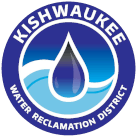Industrial Pretreatment
Protecting the Environment from Industrial Waste
Water pollution makes water unsafe for drinking, fishing, swimming and other activities. The Clean Water Act of 1972 prohibits anybody from discharging pollutants into the waters of the United States unless they have an NPDES (National Pollution Discharge Elimination System) permit.
What Are Regulated Pollutants
Pollutants regulated by the Clean Water Act of 1972 include:
- Solid waste
- Sewage
- Garbage
- Sewage sludge
- Chemical wastes
- Biological materials
- Radioactive materials
- Heat
- Rock and sand
- Industrial, municipal and agricultural waste
Discharge Permits
The KWRD holds NPDES Permit Number #IL0023027, permitting us to discharge treated water into the Kishwaukee River. The permit outlines strict rules we must follow to maintain the health of the river. Through the Local Limits Program, the KWRD regulates discharge entering the collection system to make sure we stay within the limits of our permit.
Under the Federal Water Pollution Control Act, the KWRD permits a number of significant industrial users in our area. Discharge from these users, because of the amount or type of pollutants they might produce, is tested regularly to prove it does not exceed pollution limits.
If an industry meets criteria established by the U.S. Environmental Protection Agency labeling it a significant industrial user, the District samples and tests its discharge to make sure it is within the limits for potentially harmful substances. Some industries may be required to pretreat their effluent to reduce the level of pollutants before they discharge it.
For more information on industrial pretreatment, contact Executive Director Mark Eddington, P.E., at (815) 758-3513.

